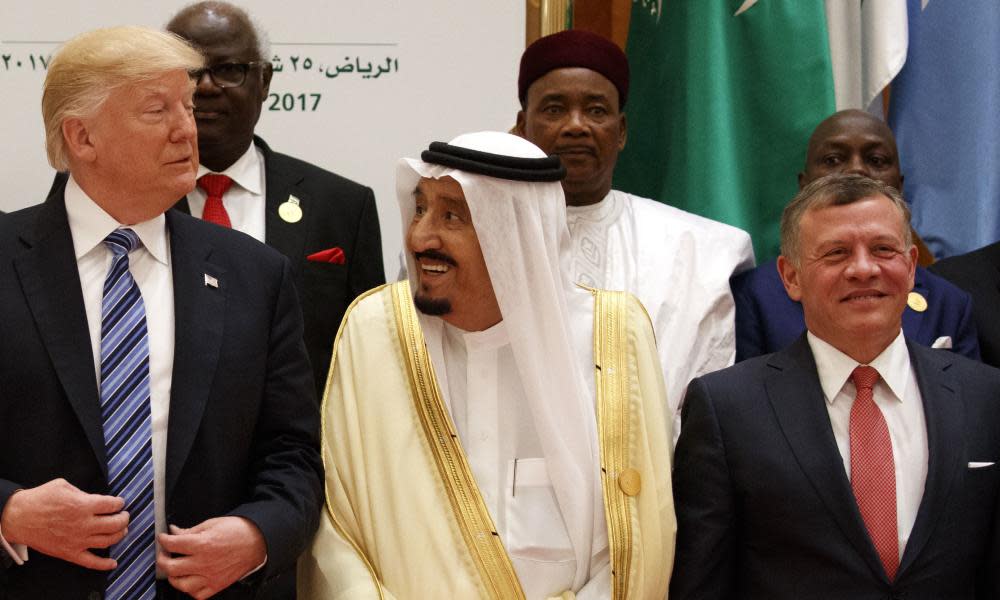Trump's tough talk on extremism weakened by backing for autocracies

It was billed as a landmark speech on Islam, but Donald Trump’s address in Riyadh boiled down to an offer of unstinting, unquestioning support for Arab autocracies in their regional rivalry with Iran.
Trump called on the Gulf monarchs to do more to combat terrorist groups and cut off their source of funding, and that was the ostensible central theme, but US support was not made conditional on that effort.
US administrations have routinely made such appeals. Barack Obama made similar exhortations in a speech in Cairo in June 2009, another attempt to address Islam early on in a presidency. “The sooner the extremists are isolated and unwelcome in Muslim communities, the sooner we will all be safer,” Obama said then. Trump was blunter: “Drive them out,” he said repeatedly at the climax of the speech.
But the intent and context for the two speeches eight years apart were very different. Obama spoke at Cairo University and the intended audience was the educated populace of the Islamic world, pressing for greater liberties.
After the turmoil of the Arab spring and the disaster of the Syrian conflict, Trump’s speech on Sunday marked a deliberate bookend to his predecessor’s values-led approach. It was delivered in an ostentatious hall to absolute rulers, hosted by a regime with an appalling human rights record and it promised that the US would no longer question the way they went about running their countries.
“Our friends will never question our support, and our enemies will never doubt our determination. Our partnerships will advance security through stability, not through radical disruption. We will make decisions based on real-world outcomes – not inflexible ideology,” Trump said. “We will be guided by the lessons of experience, not the confines of rigid thinking. And, wherever possible, we will seek gradual reforms – not sudden intervention.”
The US president evoked peace and justice, but the word freedom was conspicuous by its absence. The rhetoric was wrapped in the same self-aggrandising hyperbole as his domestic speeches. Trump described the Riyadh meeting as “unique in the history of nations” but did not explain what made it unique other than being the first one he had attended. And he drifted into messianic territory when he predicted it might mark “the beginning of peace in the Middle East and maybe all over the world”.
The Riyadh speech is reported to have gone through five drafts and the end result was a much softer approach to Islam, certainly compared with Trump’s presidential campaign, which was run to a large extent on Islamophobia and the blurring of the distinction between the religion and terrorism. “I think Islam hates us … There is a tremendous hatred,” he said a little over a year ago.
On Sunday there was a recognition that 95% of the victims of terrorism were Muslims but there were also nods to Trump’s supporters at home, signalling that he had not entirely abandoned his campaign themes. He did not quite repeat his buzzphrase “radical Islamic terrorism”, which he has insisted is the most honest description of the greatest threat facing the US, but he did talk about “Islamic terror of all kinds”, words which fell like lead on the sumptuously carpeted chamber in Riyadh.
The Saudi hosts will not have minded. For them the summit was a diplomatic masterstroke. They treated Trump like a fellow royal, literally garlanding him in gold, and promised to buy $350bn in US arms over the coming decade.
For that, together with appropriate language about the promotion of extremism from the Gulf, they got a promise that Trump would not abandon Arab rulers in the face of popular unrest, as the Saudis believe Obama dumped Hosni Mubarak in Egypt. And they got Washington to definitively take sides in what they see as a life-and-death struggle with Iranian-led Shia Islam. Shia leaders had not been invited to the summit.
To that end, Trump congratulated the Saudis and their allies for taking “strong action against Houthi militants in Yemen”, with no criticism of the mass civilian casualties caused by aerial bombardment and a naval blockade. He poured disdain on Iran and its system of government, seemingly oblivious to the irony of speaking from the capital of one of the most autocratic countries on earth, the day after more than 40 million Iranians went to vote in presidential elections and chose a moderate reformer to lead them.
That was one of many contradictions in Trump’s remarks. It is not at all clear how doubling down on US support for Arab autocracies will dim the extremism that the same autocracies have helped foster over decades, or how providing arms and support to one side in a murderous proxy war in Yemen will help further peace. The one theme that did emerge with full clarity was that Trump’s speech in Riyadh marked the end of any pursuit of balance in US policy towards sectarian conflict in the Middle East.

 Yahoo News
Yahoo News 
